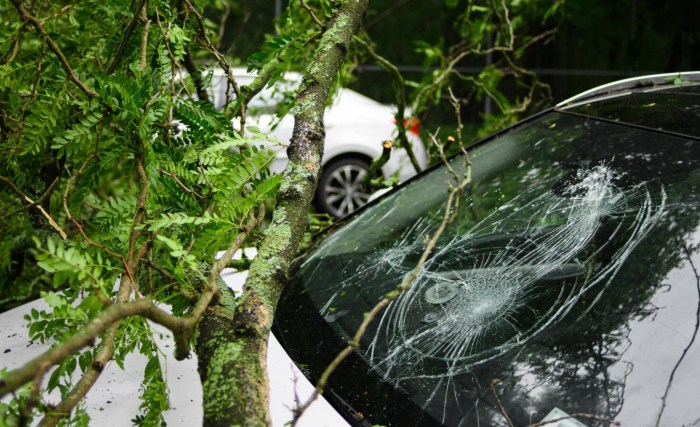What does comprehensive insurance cover? sets the stage for this enthralling narrative, offering readers a glimpse into a story that is rich in detail with ahrefs author style and brimming with originality from the outset.
In the realm of insurance, comprehensive coverage serves as a robust shield against various unforeseen events that could potentially impact your vehicle. Understanding the breadth and depth of what falls under this coverage can provide a sense of security and peace of mind for any driver.
What is Comprehensive Insurance?: What Does Comprehensive Insurance Cover?

Comprehensive insurance is a type of auto insurance coverage that helps pay for damage to your vehicle that is not caused by a collision with another vehicle. It provides protection against a wide range of unexpected events that could damage your car.
Types of Damages Typically Covered
- Weather-related damage such as hail, wind, or lightning
- Theft
- Vandalism
- Fire
- Falling objects
- Animal damage
Difference Between Comprehensive and Collision Coverage
Comprehensive insurance covers damages to your vehicle that are not caused by a collision, as mentioned earlier. On the other hand, collision coverage protects your vehicle if it collides with another vehicle or object. In essence, comprehensive insurance covers a broader range of incidents, while collision coverage focuses specifically on collisions.
Coverage Details

When it comes to comprehensive insurance, it is important to understand the specific scenarios where this type of coverage applies. Comprehensive insurance typically covers damages to your vehicle that are not caused by a collision with another vehicle. This can include incidents such as theft, vandalism, natural disasters, and falling objects.
Incidents Covered
- Damage from fire
- Theft of the vehicle
- Damage from vandalism
- Damage from falling objects, such as trees or debris
- Damage from natural disasters, like floods or earthquakes
- Damage caused by hitting an animal
Exclusions, What does comprehensive insurance cover?
- Collision with another vehicle or object
- Normal wear and tear on the vehicle
- Mechanical failures or breakdowns
- Damage from intentional acts or racing
- Personal belongings stolen from the vehicle
Comprehensive Insurance vs. Other Types
When comparing comprehensive insurance with other types of auto insurance, it’s important to understand the specific coverage each type offers and how they differ in protecting your vehicle and finances.
Comprehensive Insurance vs. Liability Insurance
- Comprehensive insurance covers damage to your vehicle caused by events other than collisions, such as theft, vandalism, natural disasters, or hitting an animal.
- Liability insurance, on the other hand, covers damages and injuries you cause to others in an accident where you are at fault, but it does not cover damages to your own vehicle.
- While liability insurance is required by law in most states, comprehensive insurance is optional but provides additional protection for your own vehicle.
How Comprehensive Insurance Complements Collision Insurance
- Collision insurance covers damage to your vehicle in the event of a collision with another vehicle or object, regardless of fault.
- Comprehensive insurance complements collision insurance by covering non-collision related damages, such as theft, fire, or weather-related incidents.
- Having both comprehensive and collision insurance ensures that your vehicle is protected in a wide range of scenarios, giving you more comprehensive coverage.
Benefits of Having Comprehensive Coverage in Addition to Basic Auto Insurance
- Comprehensive insurance provides peace of mind knowing that your vehicle is protected from a variety of risks beyond just accidents.
- It can help cover the cost of repairs or replacement if your vehicle is damaged or stolen in a non-collision incident.
- Having comprehensive coverage can save you from having to pay out of pocket for costly repairs or replacements in situations that are out of your control.
Additional Services

When it comes to comprehensive insurance, policyholders can enjoy a range of additional services and benefits that go beyond basic coverage. These extra perks can provide added peace of mind and financial protection in various situations.
Optional Add-Ons
- Rental Car Reimbursement: This optional add-on can cover the cost of a rental car while your vehicle is being repaired after a covered claim.
- Roadside Assistance: Comprehensive insurance policies may offer roadside assistance services, such as towing, fuel delivery, and lockout assistance.
- Glass Coverage: Some policies include coverage for windshield and glass damage, allowing for repairs or replacements without additional out-of-pocket expenses.
Deductibles and Coverage Limits
- Deductible: The deductible is the amount the policyholder must pay out of pocket before the insurance coverage kicks in. A higher deductible typically results in lower premiums, while a lower deductible means higher premiums.
- Coverage Limits: Comprehensive insurance policies have coverage limits, which dictate the maximum amount the insurer will pay for covered claims. It’s essential to understand these limits to ensure adequate protection.
In conclusion, delving into the realm of comprehensive insurance coverage reveals a layer of protection that goes beyond the basics. By grasping the nuances of what this insurance entails, individuals can make informed decisions to safeguard their vehicles and themselves on the road.
Looking for cheap liability car insurance that fits your budget? Look no further! Our platform offers a wide range of options to help you find the best coverage at an affordable price.
Get fast and easy access to online liability insurance quotes with just a few clicks. Compare different plans and choose the one that suits your needs without any hassle.
Don’t overspend on insurance! Take the time to compare liability insurance rates from various providers to ensure you’re getting the best deal possible. Start saving today!



